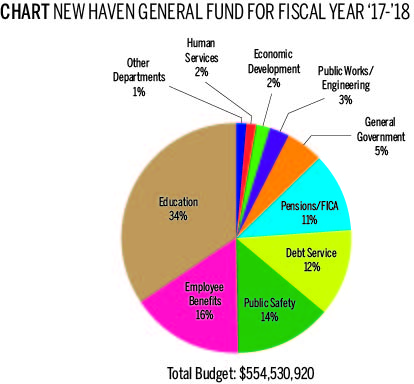
Mayor Toni Harp’s initial budget plan will not include new aggregate tax increases or city employee layoffs but also will not support new jobs or services because of tight fiscal conditions at both the local and state levels.
Harp, speaking before a group of about 30 reporters, residents and city officials across in City Hall on Tuesday afternoon, described the plan as a “current services budget” meant to pay only for current city initiatives. City finance department Controller Daryl Jones, who worked on the budget with the mayor and who was invited to speak by her, also described the proposal as a “basic budget” and said he hoped the plan would allow the city to successfully balance its budget, as it has done over the last three years.
“This budget keeps the lights on and food on the table, so to say,” Harp said.
Harp added that although aggregate taxes would not increase, specific taxes did fluctuate from previous budgets due to revaluation of properties. She added that the city’s mill rate, which measures how much a property owner pays relative to the value of their property, decreased by about 7 percent.
The announcement comes at the outset of a budget planning season that could prove especially challenging for the city. On Feb. 8, Gov. Dannel Malloy said he was considering shifting much of the responsibility for paying public school teachers’ pensions from state government to municipalities in order to alleviate the state’s $1.7 billion budget deficit.
If Malloy’s plan is finalized by the state Legislature, New Haven will be expected to pay an additional $15 million in pension payments, which represents about 3 percent of the city’s expected $500 million budget, according to city spokesman Laurence Grotheer. State legislators have begun discussions about the state budget and are expected to finalize that budget by early June.
In her Tuesday speech, the mayor expressed concern that the state also might not supply the city with enough money through the Payment in Lieu of Taxes program, leaving the city without enough money to cover its expenses. Through the program, the state sends the city money to compensate for nontaxable institutions within the city, such as Yale and other universities, which the city services but from which the city does not collect tax revenue.
The mayor said if the state were compensating the city for all the tax money the city loses from hosting these institutions, New Haven would receive $70 million through the program annually. But Harp said this year she expects only $30 million from the state.
Harp explained that the budget she presented Tuesday was created with the expectation that the city would receive enough state funding to cover its current expenditures. The city would be forced to strip down its budget if the state tightened its purse strings.
“It’s important to remember the extent to which New Haven is utterly reliant on state funding to balance its budget,” Harp said at the Tuesday meeting. “We’ll work with the city’s legislative delegation and other state officials, including the governor himself, to underscore the need for that minimum level of state aid,” she added, referring to the $30 million in PILOT funding.
City officials emphasized that this was only the first step in a lengthy process of budget negotiations. At the Tuesday conference, City Budget Director Joe Clerkin said Elm City officials would work closely with state representatives to put together a budget in sync with the final state budget by July 1.
Until that time, many city officials will make trips to Hartford to lobby for adequate PILOT funding and to keep other payment responsibilities, including teacher pension payments, at the state level. Alder Darryl Brackeen of Ward 26 said on Feb. 23 that he had been in the state’s capital for the past two weekends advocating on behalf of the city.
In a conversation with the News following the Tuesday announcement, Harp said she has been and will continue to do the same as Brackeen until a state budget is finalized. She also said she would work to give cities a role in future state budget discussions, which they currently lack.
“Right now, cities have no authority regarding this pension question,” Harp said. “We’re going to work to make sure that … cities have some way of making decisions on how funds are distributed.”
Harp added that it was a problem that at present, the state regards city governments not as partners but as “people who just pay the bill.” She also reiterated that she did not believe taxing Yale New Haven Hospital was a stable means of covering the city’s expenses.
Almost half of all property in New Haven is tax exempt.







